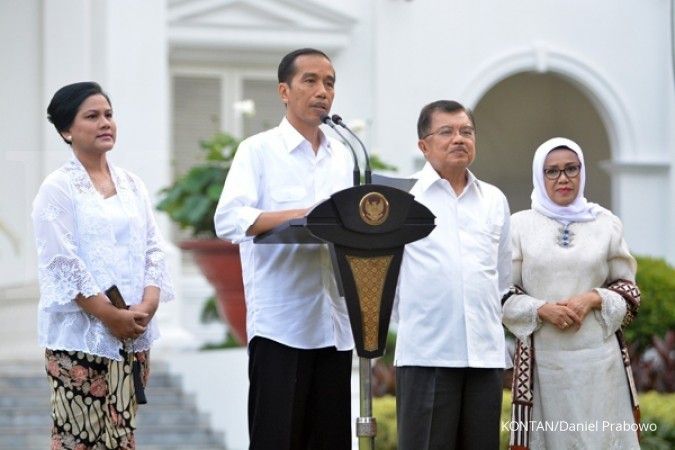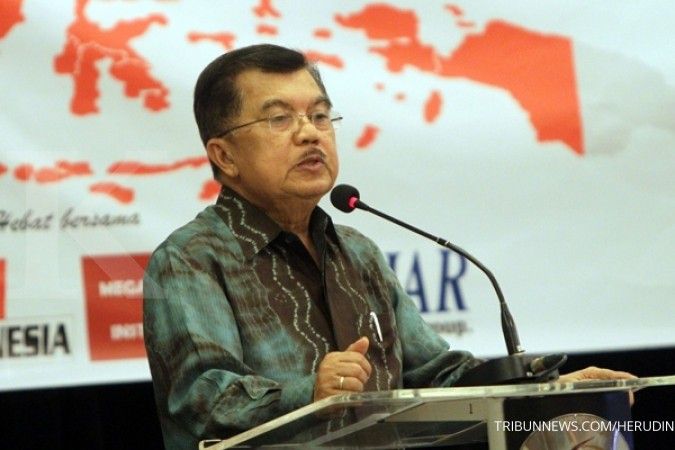BEIJING. Appearing upbeat and donning a stylish suit, President Joko “Jokowi” Widodo met China President Xi Jinping on Sunday on the first leg of his overseas trip since taking office on Oct. 20. Jokowi suggested the leader of the world’s second-biggest economy bolster ties through “concrete” actions. In his introduction note to Xi at his office in Beijing, Jokowi said Indonesia’s relationship with China, which stretched hundreds of years, was underlying capital to expand future strategic partnerships. “Indonesia wants this relationship to materialize into more concrete outcomes so that the people of the two nations can reap mutual benefits,” said Jokowi, who was accompanied by Coordinating Economic Minister Sofyan Djalil, Foreign Minister Retno LP Marsudi, Trade Minister Rachmat Gobel and foreign affairs expert Rizal Sukma of the Centre for Strategic and International Studies (CSIS). In his welcoming note, Xi congratulated Jokowi for his ascension to the presidency and hoped that under his leadership Indonesia would not only see more rapid development but also play more of a role in dealing with regional and international issues. “China has always regarded Indonesia as our old best friend and we have always prioritized keeping our relations intact by seeing Indonesia as a strategic partner that we can trust,” said Xi. In a press conference later in the evening, Jokowi explained that he had requested of Xi that China be more involved in Indonesia’s infrastructure development, particularly in the maritime sector. “What I mean by concrete outcomes is that there should be more progress in the sectors of investment and trade. I’ve requested to President Xi that Chinese state companies be involved more in the construction of our seaports, railways and toll roads,” he said. Jokowi has also demanded bigger role in the China-led Asian Infrastructure Investment Bank (AIIB), by proposing that the bank open its headquarters in Jakarta for funds to flow into the country. “China will of course have a 50 percent stake in the bank. We will also have a stake, but smaller. We will inject around Rp 5 trillion [US$ 416.67 million) in participating funds to be paid in installments over five years,” he said. The planned bank, which so far involves 21 countries, is seen by many as China’s attempt to shore up regional support and rival the domination of the US-led World Bank. “Infrastructure development is our most pressing issue. There should no longer be delays. The faster we build, the lower the cost. There should be political affirmation to speed them up,” said Jokowi. The President took the opportunity to visit Tianjin, home to one of the world’s busiest container ports, to see firsthand the city’s integrated service center, port management and a nearby power plant. Jokowi said he would replicate the development of the integrated port system in Tianjin in his plan to build 24 ports nationwide. “The development of our ports in the future should be integrated with power plants and industrial zones to boost the competitiveness of our products,” he said. Earlier in the day, Jokowi met with Chinese and Indonesian businesspeople to elaborate on his future policy guidelines. The event, jointly held by the Indonesian Chamber of Commerce and Industry (Kadin) and its Chinese counterpart, was attended by several of Indonesia’s tycoons, including Tomy Winata of Artha Graha Group and Franky O. Widjaja of Sinar Mas. Jokowi appealed to the businesspeople to focus on the development of infrastructure and said he would immediately guarantee a smooth license process and land clearance to help accelerate construction. He also indicated he would keep the ban on raw mineral exports and appealed to Chinese businesses to invest in value-added refinements in Indonesia for the two nations to reap the benefits. “We want Indonesia to have that added value. Our cooperation should not benefit only one side,” he said. (Rendi A. Witular)
Jokowi asks more of China
BEIJING. Appearing upbeat and donning a stylish suit, President Joko “Jokowi” Widodo met China President Xi Jinping on Sunday on the first leg of his overseas trip since taking office on Oct. 20. Jokowi suggested the leader of the world’s second-biggest economy bolster ties through “concrete” actions. In his introduction note to Xi at his office in Beijing, Jokowi said Indonesia’s relationship with China, which stretched hundreds of years, was underlying capital to expand future strategic partnerships. “Indonesia wants this relationship to materialize into more concrete outcomes so that the people of the two nations can reap mutual benefits,” said Jokowi, who was accompanied by Coordinating Economic Minister Sofyan Djalil, Foreign Minister Retno LP Marsudi, Trade Minister Rachmat Gobel and foreign affairs expert Rizal Sukma of the Centre for Strategic and International Studies (CSIS). In his welcoming note, Xi congratulated Jokowi for his ascension to the presidency and hoped that under his leadership Indonesia would not only see more rapid development but also play more of a role in dealing with regional and international issues. “China has always regarded Indonesia as our old best friend and we have always prioritized keeping our relations intact by seeing Indonesia as a strategic partner that we can trust,” said Xi. In a press conference later in the evening, Jokowi explained that he had requested of Xi that China be more involved in Indonesia’s infrastructure development, particularly in the maritime sector. “What I mean by concrete outcomes is that there should be more progress in the sectors of investment and trade. I’ve requested to President Xi that Chinese state companies be involved more in the construction of our seaports, railways and toll roads,” he said. Jokowi has also demanded bigger role in the China-led Asian Infrastructure Investment Bank (AIIB), by proposing that the bank open its headquarters in Jakarta for funds to flow into the country. “China will of course have a 50 percent stake in the bank. We will also have a stake, but smaller. We will inject around Rp 5 trillion [US$ 416.67 million) in participating funds to be paid in installments over five years,” he said. The planned bank, which so far involves 21 countries, is seen by many as China’s attempt to shore up regional support and rival the domination of the US-led World Bank. “Infrastructure development is our most pressing issue. There should no longer be delays. The faster we build, the lower the cost. There should be political affirmation to speed them up,” said Jokowi. The President took the opportunity to visit Tianjin, home to one of the world’s busiest container ports, to see firsthand the city’s integrated service center, port management and a nearby power plant. Jokowi said he would replicate the development of the integrated port system in Tianjin in his plan to build 24 ports nationwide. “The development of our ports in the future should be integrated with power plants and industrial zones to boost the competitiveness of our products,” he said. Earlier in the day, Jokowi met with Chinese and Indonesian businesspeople to elaborate on his future policy guidelines. The event, jointly held by the Indonesian Chamber of Commerce and Industry (Kadin) and its Chinese counterpart, was attended by several of Indonesia’s tycoons, including Tomy Winata of Artha Graha Group and Franky O. Widjaja of Sinar Mas. Jokowi appealed to the businesspeople to focus on the development of infrastructure and said he would immediately guarantee a smooth license process and land clearance to help accelerate construction. He also indicated he would keep the ban on raw mineral exports and appealed to Chinese businesses to invest in value-added refinements in Indonesia for the two nations to reap the benefits. “We want Indonesia to have that added value. Our cooperation should not benefit only one side,” he said. (Rendi A. Witular)



